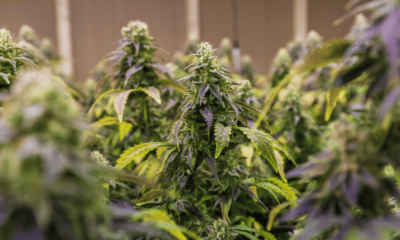By now, we all know about the benefits of CBD and THC – and even CBG – but CBN, CBC and CBDa are just some of the other cannabinoids with huge potential for our health and wellbeing.
If you’re reading this, you have probably heard of CBD by now. Also known as cannabidiol (CBD) is a non-intoxicating compound found in the cannabis plant.
You’ve also no doubt heard of tetrahydrocannabinol (THC) the main intoxicating compound in the plant, which is still illegal unless prescribed in the UK.
Since CBD has been more widely available and accepted by mainstream wellness consumers, the market has become saturated with products – from sugary drinks and snacks to skincare – of which some would say, are more style than substance.
But while consumers may find CBD oil UK to have a range of benefits, it’s not the only compound worth knowing about, in a plant which has been used for medicinal purposes for centuries.
There are thought to be over 144 cannabinoids in the cannabis plant, and to date scientists have only identified a handful of them, let alone the scope of their potential benefits.
That’s not to mention all of the terpenes and flavonoids, responsible for the smells and taste of natural plants and ingredients, which have their own therapeutic benefits. (But we’ll come back to these another day).
Here, we take a closer look at some of the lesser-known cannabinoids and what the science says about them so far.
Cannabinol (CBN)
CBN is the cannabinoid which is produced as the compounds in THC break down as it ages and is exposed to oxygen over time.
While it is largely thought of as non-intoxicating due to the fact it is much weaker than THC, in some higher doses it could produce some mild psychoactive effects.
Early evidence suggests it to be a potent antibacterial agent, a neuroprotectant and may also be beneficial for glaucoma.
CBN is often referred to as a sedative, indicating it may be helpful for treating insomnia, but so far there isn’t the evidence to back this up.
Instead, it may be the combination of CBN and THC that actually causes the sedative effect.
A study in humans, published in the 1970s found that while CBN alone didn’t make participants feel any sleepier, when they tested CBN and THC together, the two produced higher levels of drowsiness.
It could also be the fact that aged cannabis which is high in CBN is also high in sedating terpenes, according to leading cannabis researcher, Dr Ethan Russo, who explained that in older cannabis the “monoterpenoids have evaporated leaving the more sedating oxygenated sesquiterpenoids” behind.
Also worth noting is that as CBN is not plentiful in fresh cannabis, it is harder to obtain compared to some of the other more prominent cannabinoids, and often only found in small quantities.
Cannabidiolic acid (CBDA)
CBDA is a compound found in the live cannabis plant, which converts to CBD once exposed to high levels of heat over time.
It doesn’t bind directly with the CB1 or CB2 receptors; instead, it interacts with the endocannabinoid system by inhibiting the cyclooxygenase-2 (COX-2) enzyme, which is associated with pain and inflammation.
CBDA has been shown to demonstrate effects similar to CBD, such as an anti-inflammatory and anti-convulsant.
A recent study has also found that the compounds cannabigerolic acid (CBGA) and cannabidiolic acid (CBDA), may have the ability to prevent the virus that causes Covid-19 from entering human cells.
Cannabichromene (CBC)
CBC is another non-intoxicating cannabinoid, which doesn’t seem to get as much attention as some of its counterparts.
Despite this, it is considered one of the “big six” cannabinoids prominent in medical research, with therapeutic potential for a range of indications.
It works in the body by binding to the vanilloid receptor 1 (TRPV1) and transient receptor potential ankyrin 1 (TRPA1), both of which are linked to how we feel pain.
It is thought that this cannabinoid might be a powerful anti-cancer agent, second only to CBG, as well as reducing pain and inflammation.
In one study, CBC was shown to be beneficial for acne, along with CBD. Other research has shown that it may help promote healthy brain function by having a positive effect on neural stem cells in the brain.
Whereas CBN is touted for its sedative potential, CBC is thought to have more uplifting effects. There is growing interest in its ability to treat depression, particularly when combined with THC and CBD, it may deliver an entourage effect of mood-boosting properties.
A 2010 study showed animals performed better on stress tests after being administered CBC – chronic stress is known to be a major trigger for depression.
The entourage effect
The entourage effect is the idea that the therapeutic potential of all the compounds found in the cannabis plant together, is greater than any one individually. As a result, many experts argue that products containing a full spectrum of cannabinoids are more beneficial than those just which use isolated CBD.
Hemp Point’s full spectrum CBD oil UK contains a range of minor cannabinoids as well as 20+ different terpenes, so consumers can experience the benefit of the whole plant for themselves.

Home » Science » CBN, CBC and CBDa – the cannabinoids to have on your radar

 Science5 months ago
Science5 months ago
 Industry6 months ago
Industry6 months ago
 News5 months ago
News5 months ago
 News6 months ago
News6 months ago
 Health5 months ago
Health5 months ago
 Health3 months ago
Health3 months ago
 Science5 months ago
Science5 months ago
 Cannabis explained5 months ago
Cannabis explained5 months ago













